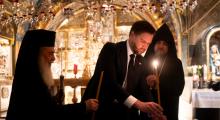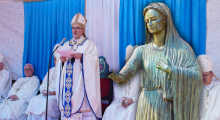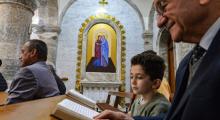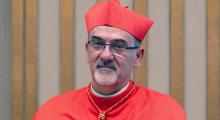Issued by the Catholic Center for Studies and Media - Jordan. Editor-in-chief Fr. Rif'at Bader - موقع أبونا abouna.org
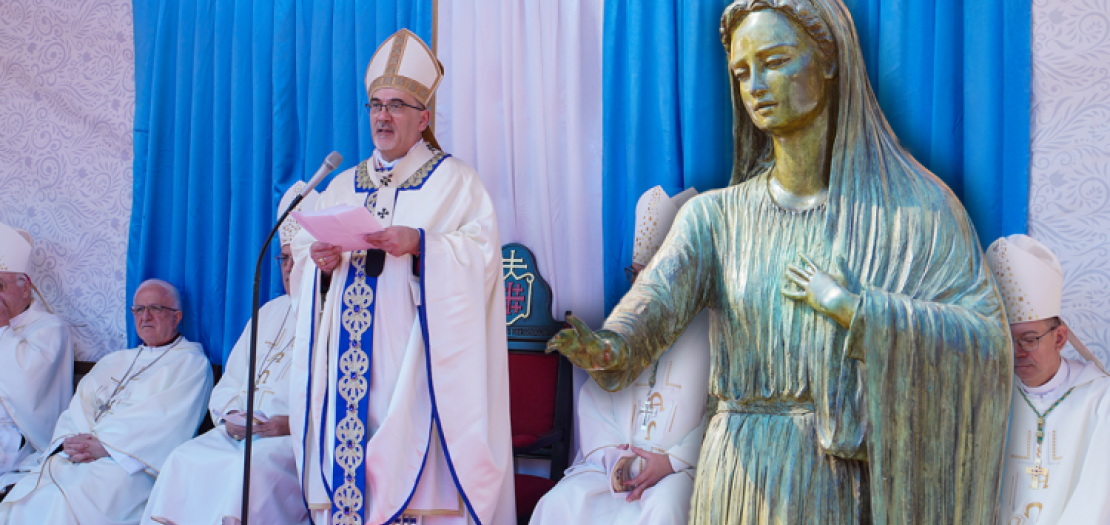
Following is the text of the Homily Solemnity Queen of Palestine 2025 by His Beatitude Cardinal Pierbattista Pizzaballa, Latin Patriarch of Jerusalem, on October 25, 2025:
Dear Excellencies, dear brothers and sisters,
The Lord give you His peace!
As in previous years, I would like to reflect on some of the insights that the Word of God offers us on this beautiful day of prayer and communion around the Blessed Virgin Mary.
The reading from the Acts of the Apostles begins with a phrase that has always struck me, and today, more than ever, it can inspire the life of our ecclesial communities: “They returned to Jerusalem from the mount called Olivet, which is near Jerusalem.” (Acts 1:12)
The disciples returned to Jerusalem, to the Upper Room, where they would soon receive the Holy Spirit on Pentecost, together with the Blessed Virgin Mary. They returned to the city - the place where life, relationships, and community flourish.
After Jesus’ crucifixion and death, the disciples had scattered. With His death, something inside their hearts had also died. They lost the hope that once animated them. Though they resumed their daily activities, they felt disappointment and a sense of failure within. The two disciples on the road to Emmaus expressed it clearly: “We had hoped that he was the one to redeem Israel.” (Luke 24:21)But after encountering the Risen Lord, everything changed. It took time for them to understand the meaning of what had happened, but eventually, they returned to the fullness of life. The hope that had seemed like disappointment gradually became a firm and living faith.
I believe this expression speaks to us today as well. War has disrupted our lives for too long. On one hand, we have experienced the tragedy of war, which we hope will finally end, even though political difficulties and their consequences continue to weigh heavily on each of our families. This has increased in us the same feelings of mistrust and disappointment that the disciples felt. On the other hand, it seems we can begin to think that perhaps life can resume, that we can start to look to the future more positively. Here lies the expression that strikes me most: “to return.” We must no longer allow the Dragon of the Apocalypse to paralyze us - within or around us - as happened to the disciples.
I do not know if the war is truly over, but we know the conflict will continue. We must resist the temptation to see it merely as a period in the life of our Church, however long it may last. The conflict, the complex political and religious dynamics, and the inevitable consequences of mutual prejudice and fear have now become an integral part of our ecclesial identity. They are not simply obstacles to be overcome in order to live; rather, they constitute the very place where the life of the Church is called to express itself. They are the context in which we are called to bring our light, our perspective, our hope. A context that is destined to remain.
This is not only a personal call, but a vocation that involves the entire ecclesial community. We are therefore called to choose how to live in this conflict: whether to let it shape our thinking and our perspective, or to decide for ourselves how to live it as a Christian community. We must ask ourselves whether we have something different, authentic, and truly our own to say about life in our Holy Land.
I feel I must affirm that, however turbulent and difficult these times may be, we are called to return to living with fullness, passion, and vitality. We must reaffirm our commitment to Christ and, like the disciples, draw from Him the strength to return to Jerusalem, to return to life, in order to give that life to the confused men and women of our time.
The Gospel of Luke, who is also the author of the Acts of the Apostles, ends with the same expression: “They returned to Jerusalem,” but also adds, “with great joy.” (Luke 24:52) We too need to return to life with that same great joy that filled the hearts of the disciples after Jesus ascended into heaven.
They received the Holy Spirit precisely there - in the midst of ordinary life - and from there they set out anew after Pentecost. We too must return to ordinary life; we must allow life to flow again among us. We must look within ourselves to free ourselves from the fears that block us and prevent us from seeing beyond what is happening. What was possible for the disciples is also possible for us.
But first, we must believe. Believe that it is still possible to live this way. I know that many of our problems will remain, that we will not see true peace anytime soon. Not even the disciples saw it. But they did not remain on the mountain looking “toward heaven,” (Acts 1:11) nor did they stay locked in the Upper Room out of fear. They returned to Jerusalem, to life in the city, and “were constantly devoting themselves to prayer” (Acts 1:14). From Jerusalem, the community of disciples set out again in a new way. We too, “devoting and united in prayer,” want to ask God, through the intercession of the Virgin Mary, for the courage to turn the page and rebuild our lives from scratch, drawing the strength and perseverance we need from our encounter with the Risen One.
Today, the Virgin Mary tells us that night may surround us, but she reminds us that the Risen Christ is our light. And if the Light is with us, there is no longer any reason to fear the darkness. We must not fear the difficulties that will inevitably come our way; rather, let us ask for the courage to rise and walk again.
The Gospel also invites us to believe in the work of God: “Blessed is she who believed that there would be a fulfillment of what was spoken to her by the Lord.” (Lk 1:45) In these two women - Mary and Elizabeth - something ordinary occurs: two pregnancies. But they know they have something extraordinary within them, the life of two children, born only through the power and work of God. That extraordinary work was possible because they believed. “Blessed is she who believed!” Blessed are we when we believe that even in our ordinary lives, God can do extraordinary things.
Today, the Blessed Virgin invites us to throw off the works of darkness and put on the armor of light, (cf. Rom 13:12) to cease merely lamenting the death that surrounds us and begin again to create spaces of life and hope, to lift our gaze and recognize the much good that is still being done, which gives us hope. Because even in our troubled context, this is still possible.
The compassion of so many people who reach out to those who suffer - in hospitals, in prisons, under bombardment, and wherever there is pain; the cooperation and solidarity of people from all walks of life who dedicate themselves to helping in so many ways; the closeness of Churches around the world, some very poor, who want to support our Church not only with prayer but also in concrete ways, and not only in Gaza but throughout the Holy Land. There are many examples where a little light shines through, despite the darkness of the night.
In a way, the power of the Dragon of the Apocalypse, mentioned in the second reading, which symbolizes the great evil unleashed upon us, has also awakened a response in many people toward goodness, solidarity, communion, and sharing. People from all walks of life have wanted to be with us during this time. I am thinking especially of the many children who gave up what little they had to share with their peers in the Holy Land. The Dragon, the Devil, is powerless where there is love. And that is where we want to be.
Take courage, then! Let us look forward with confidence. God has not abandoned us, and He will not leave us alone.
Let us ask Our Lady of Palestine to open our hearts to hope, to open our eyes and hearts not only to our own problems but also to the presence of God among us: among our poor, in our families, in our religious and parish communities, and in our civil society. Once again, we entrust to her our Patriarchal Diocese of Jerusalem, that she may give us the strength to be bearers of joy and hope in our Holy Land.
Amen.


